动词不用被动语态
英语不能用被动语态的情况

不能用被动语态的情况初中语法:1) 不及物动词或动词短语无被动语态:appear, die disappear, end (vi. 结束), fail, happen, last, lie, remain, sit, spread, stand break out, come true, fall asleep, keep silence, lose heart, take place.After the fire, very little remained of my house.比较:rise, fall, happen是不及物动词;raise, seat是及物动词。
(错) The price has been risen.(对) The price has risen.(错) The accident was happened last week.(对) The accident happened last week.(错) The price has raised.(对) The price has been raised.(错) Please seat.(对) Please be seated.要想正确地使用被动语态,就须注意哪些动词是及物的,哪些是不及物的。
特别是一词多义的动词往往有两种用法。
解决这一问题唯有在学习过程中多留意积累。
2) 不能用于被动语态的及物动词或动词短语:fit, have, hold, marry, own, wish, cost, notice, watch agree with, arrive at / in, shake hands with, succeed in, suffer from, happen to, take part in, walk into, belong to This key just fits the lock.Your story agrees with what had already been heard.3) 系动词无被动语态:appear, be become, fall, feel, get, grow, keep, look, remain, seem, smell, sound, stay, taste, turnIt sounds good.4) 带同源宾语的及物动词,反身代词,相互代词,不能用于被动语态:die, death, dream, live, lifeShe dreamed a bad dream last night.5) 当宾语是不定式时,很少用于被动语态。
没有被动语态的动词

没有被动语态的动词一;常见的look 看起来,sound 听起来,taste 尝起来,smell 闻起来,feel感到,go 变得,grow 变得等;二、一些不能接宾语的动词短语也没有被动语态;1.The war broke out in 1937.break out,爆发2.The story took place in a small mountain village.发生,take place三、甚至有些及物动词和可以接宾语的动词短语要看他们作什么意思讲,有时也只能有主动语态而不宜于用被动语态;1.We have six classes every day. have,上课2.The hall can hold more than 500 people. held,容纳3.The project lasted 14 years and cost I billion US st,延续4.No dish suits all tastes. suit,适合类似的还有fit ,catch ,get ,take ,own ,meet 等;四、而有些动词和短语兼有及物和不及物两种用法,所以前者有被动语态,而后者没有;1.He serves in the Navy Department. 服役,不及物2.Hamburger is served in this restaurant. 供应,及物3.The plane toke off at eight last night. 起飞,不及物类似的还有look into 作往里看,不及物;作调查、研究,及物look up 作好转,不及物;作查阅,及物等;五、而如果及物动词后的宾语是反身代词,相互代词;或者宾语前面有和主语同一人物的物主代词;或者是同源宾语的动词,也常常不能转换为被动语态;例如:1.The thief hid himself behind the door . 宾语为反身代词2.We should learn from each other. 宾语为相连代词六、带宾语从句的句子常常没有被动语态1.Marx found that his English was too limited.2.I don’t know where he lives.但是,如果主句的谓语动词是believe ,say ,know ,report 等,且宾语从句是由that ,whether引起的,则常可以用It is believed say ,know ,report that whether 的句型;七、有些及物动词有其习惯性用法,常用主动代替被动:1.It is a pretty material ,but it doesn’t wash.比较:My shirt is usually washed by myself.2. The new Ford is selling badly.比较:All newspapers have been sold out.类似的还有clean ,lock ,write ,play ,start ,cut等;八、最后要说的是另一种情况:英语中有不少动词及动词短语常用被动形式来表示主动的含义;1.Be seated, please2.We must be prepared for the worst.类似的还有be determined to ,be absorbed in , be gone , be married to , behi dden , be interested in ……and advanced mathematics ,experienced school , learned man 等中这些定语用的过去分词也是用过去分词表主动;I dreamed a good dream.我做了一个好梦一般不会说A good dream was dreamed.AS的基本用法as ... as用于比较句型,中间插入的是形容词或副词的原级;意思是"达到与什么相同的程度";如:He is as strong as a horse. 他力大如牛;二、习惯用法1. as soon as意思是"一......就......",引导一个时间状语从句;如:I'll call you as soon as I finish my homework. 我一完成我的作业,就给你打电话;2. as long as意思是"长达......之久;只要......";如:She has searched the information about dinosaurs on the Internet as long as three hours. 她在因特网上搜索有关恐龙的信息已经长达三个小时;3. as much as意思是"高达......;与......一样多";是用来表达极其多的语气;如:Some of the stones weigh as much as fifteen tons.有些石头重达15吨;★as...as用法:as...as意为"和……一样",表示同级的比较;使用时要注意第一个as为副词,第二个as为连词;其基本结构为:as+ adj./ adv. +as;例如:1This film is as interesting as that one.这部电影和那部电影一样有趣;其否定式为not as/so +adj./ adv. +as;例如:This dictionary is not as/so useful as you think.这本字典不如你想象的那样有用; 若有修饰成分,如twice, three times, half, a quarter等,则须置于第一个as之前;例如:Your bag is twice as expensive as mine.你的袋子比我的贵一倍;几个关于as...as的常见句型:1as...as possiblePlease answer my question as soon as possible.请尽快回答我的问题;2as...as usual/beforeShe looks as pretty as before.她看起来和以前一样漂亮;3as long as... 引导条件状语从句It took us as long as three years to carry out the plan.我们花了长达三年的时间才完成这项计划;4as far asHe walked as far as the railway station yesterday evening.昨天傍晚,他一直散步到火车站;5as well asShe cooks as well as her mother does.她烧菜烧得跟她母亲一样好;★as...as的结构:as + 形容词或副词原级 + as1在否定句或疑问句中可用so… as;He cannot run so/as fast as you.2当as… as 中间有名词时采用以下格式;as +形容词+ a +单数名词as + many/much +名词This is as good an example as the other is.I can carry as much paper as you can..3用表示倍数的词或其他程度副词做修饰语时,放在as的前面;This room is twice as big as that one.Your room is the same size as mine.4 倍数+ as + adj. + as <=> 倍数+ then + ofThis bridge is three times as long as that one.This bridge is three times the length of that one.Your room is twice as large as mine.Your room is twice the size of mine.。
被动语态

不用被动语态的几种情况1.不及物动词不能用于被动语态。
➢The sun is rising.➢When did the thing occur?2.系动词(look、sound、feel、smell、taste、appear、seem、go、prove、turn、become、fall、get、keep)不能用于被动语态。
➢It sounds very good.3.表示开始、结束、运动的动词(begin、start、finish、open、close、stop、end、shut、run、move)不用于被动语态。
➢Class begins at eight o’clock.4.read、write、wash、smell、wear、lock等动词与well、easily、smoothly等连用时,主动形式表被动意义.➢The pen writes smoothly.➢The coat washes easily.5.一部分动词(print fry hang build make)用进行时,就可以表示被动意义。
➢The novel is painting.➢The supper is cooking6.这些动词(need want require deserve),以物做主语时,后面接的动名词的主动形式表被动意义。
➢My watch needs/wants/requires repairing.➢Who said the boy deserves punishing?7.一部分及物动词(fit、wish、cost、leave、enter、reach、suit、benefit、lack、own)不用于被动语态。
8.一些动词短语(break out、take place、lose heart、come true、belong to、consist of、add up to、suffer from、happen to、take part in)不能用于被动语态。
初中英语语法大全:不用被动语态

初中英语语法大全:不用被动语态各位读友大家好,此文档由网络收集而来,欢迎您下载,谢谢初中英语语法大全:不用被动语态不用被动语态的情况1) 不及物动词或动词短语无被动语态:appear, die disappear, end , fail, happen, last, lie, remain, sit, spread, stand break out, come true, fall asleep, keep silence, lose heart, take place.After the fire, very little remained of my house.比较:rise, fall, happen是不及物动词;raise, seat是及物动词。
The price has been risen.The price has risen.The accident was happened last week.The accident happened last week.The price has raised.The price has been raised.Please seat.Please be seated.要想正确地使用被动语态,就须注意哪些动词是及物的,哪些是不及物的。
特别是一词多义的动词往往有两种用法。
解决这一问题唯有在学习过程中多留意积累。
2) 不能用于被动语态的及物动词或动词短语:fit, have, hold, marry, own, wish, cost, notice, watch agree with, arrive at / in, shake hands with, succeed in, suffer from, happen to, take part in, walk into, belong toThis key just fits the lock.Your story agrees with what had already been heard.3) 系动词无被动语态:appear, be become, fall, feel, get,grow, keep, look, remain, seem, smell, sound, stay, taste, turnIt sounds good.4) 带同源宾语的及物动词,反身代词,相互代词,不能用于被动语态:die, death, dream, live, lifeShe dreamed a bad dream last night.5) 当宾语是不定式时,很少用于被动语态。
无被动语态的动词及短语
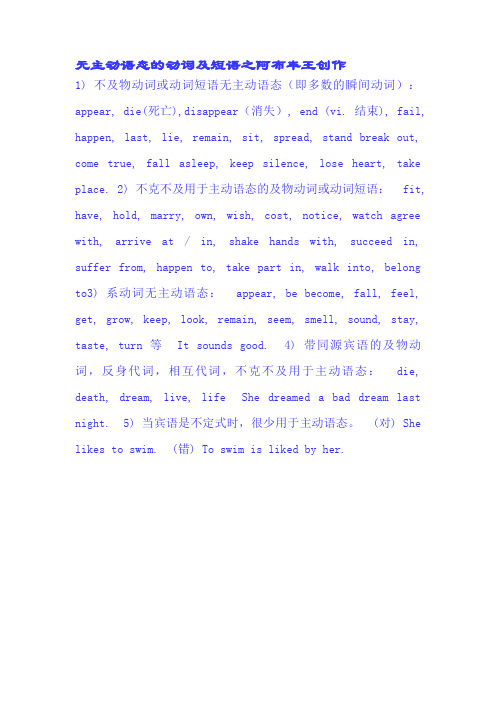
无主动语态的动词及短语之阿布丰王创作
1) 不及物动词或动词短语无主动语态(即多数的瞬间动词):appear, die(死亡),disappear(消失), end (vi. 结束), fail, happen, last, lie, remain, sit, spread, stand break out, come true, fall asleep, keep silence, lose heart, take place. 2) 不克不及用于主动语态的及物动词或动词短语: fit, have, hold, marry, own, wish, cost, notice, watch agree with, arrive at / in, shake hands with, succeed in, suffer from, happen to, take part in, walk into, belong to3) 系动词无主动语态: appear, be become, fall, feel, get, grow, keep, look, remain, seem, smell, sound, stay, taste, turn等 It sounds good. 4) 带同源宾语的及物动词,反身代词,相互代词,不克不及用于主动语态: die, death, dream, live, life She dreamed a bad dream last night. 5) 当宾语是不定式时,很少用于主动语态。
(对) She likes to swim. (错) To swim is liked by her.。
无被动语态的动词
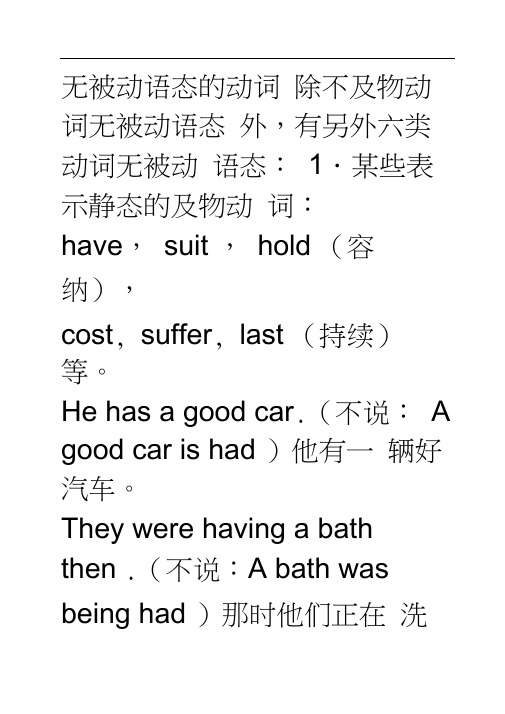
无被动语态的动词除不及物动词无被动语态外,有另外六类动词无被动语态:1.某些表示静态的及物动词:have,suit ,hold (容纳),cost, suffer, last (持续)等。
He has a good car.(不说:A good car is had )他有一辆好汽车。
They were having a baththen .(不说:A bath was being had )那时他们正在洗澡。
The shoes don't fit me.(不说:I'm not fitted by )这双鞋不合适我。
He resembles his father.(不说:His father is resembled by…)他长得像他父亲。
The shirt suits me well.(不说:I'm suited by )•这衬衫很合我身。
The room can hold 500 people.(不说:500 people can be held by )这•房间能容纳500 个人。
The book cost me five dollars.(不说:I was cost five dollars by )这本书花了我5 美元。
They suffered heavy losses.(不说:They weresuffered )…他们损失惨重。
2.某些由及物动词转变的自动词(不需借助宾语即可表达动作,区别他动词,需要借助宾语表达动作)这类动词常见的有:promise (有指望),sell, wash,write ,wear,read,break out,run out ,give out,add up to,take place,turn out (证实),catch (挂住),The goods sell well.(不说:…are sold )••• 这些商品畅销。
英语中不能用于被动语态的动词都有哪些

1.need, want, require(要求,需要), deserve(应得,值得), be worth值得),not bear(经不住) +doing主动表被动。
Eg. The book is worth reading. 这本书值得一读。
The old building requires repairing. 这座古建筑需要修了。
These young seedlings will require/need looking after (=need to be looked after)这些幼苗将需要小心的照管。
你的头发该剪了。
2. 不定式作定语,放在被修饰词后面,与前面被修饰的名词或代词有动宾关系,又在句子中与另一名词或代词有主谓关系,不定式要用主动表被动含义。
I have much work to do. 我有许多要做的事情。
(与work有动宾关系,与I有主谓关系)Tom is looking for a room to live in. Tom在找一间住的房间。
(与room有动宾关系,与Tom 有主谓关系)他要维持一个家庭。
(与family有动宾关系,与he有主谓关系)3. 不定式修饰作表语和宾语补足语的形容词时,结构:主语+系动词+形容词+ 不定式;动词+宾语+形容词+不定式。
如果形容词是表示难易、利弊等含义,如difficult, easy, comfortable(舒适的), convenient(便利的,方便的), hard, cheap, expensive, 等,不定式用主动表被动。
The question is difficult to answer. 这个问题很难回答。
The work is easy to do. 这项工作很好做。
I found the car comfortable to ride in. 我觉得这种车很好坐。
That makes poetry difficult to write. 那就使得诗很难写。
英语中不能用于被动语态的动词都有哪些

英语中不能用于被动语态的动词都有哪些?希望高手总结一下,最好每个带一个例句。
最佳答案你就记住一些动词应用中只能用主动表示被动。
1、Need, want, require(要求,需要), deserve(应得,值得), be worth值得),not bear(经不住) 后面接doing主动表被动。
The book is worth reading. 这本书值得一读。
The old building requires repairing. 这座古建筑需要修了。
These young seedlings will require/need looking after (=need to be looked after) carefully. 这些幼苗将需要小心的照管。
Your hair wants/needs cutting (needs to be cut). 你的头发该剪了。
2、不定式作定语,放在被修饰词后面,与前面被修饰的名词或代词有动宾关系,又在句子中与另一名词或代词有主谓关系,不定式要用主动表被动含义。
I have much work to do. 我有许多要做的事情。
(与work有动宾关系,与I有主谓关系)Tom is looking for a room to live in. Tom在找一间住的房间。
(与room有动宾关系,与Tom 有主谓关系)He has a family to support. 他要维持一个家庭。
(与family有动宾关系,与he有主谓关系)3、不定式修饰作表语和宾语补足语的形容词时,结构:主语+系动词+形容词+ 不定式;动词+宾语+形容词+不定式。
如果形容词是表示难易、利弊等含义,如difficult, easy, comfortable(舒适的), convenient(便利的,方便的), hard, cheap, expensive, 等,不定式用主动表被动。
不能用于被动语态的整理总结

不能用于被动语态的总结1、there be 结构及所有的不及物动词或动词短语充当谓语时,无被动语态。
There are twelve months in a year.The war broke out in 1937.(break out, 爆发 )The story took place in a small mountain village. (take place,发生 )常见的不及物动词或动词短语有:appear, die, happen, lie(躺;位于 ), remain, occur, come true, break out, take place 等。
2、表示“状态”的谓语动词,如:last, hold, keep, suit, remain, look like, consist of 等不能用被动语态。
The hall can hold more than 500 people. (hold,容纳 )The project lasted 14 years and cost 1 billion US dollars. (last,延续 )No dish suits all tastes. (suit,适合 )The committee consists of ten members委.员会由十人组成。
3、表示“归属”的动词,如have,own ,belong to 等。
We have three meals a day我.们一日吃三餐。
We have six classes every day. (have,上课 )Our success belongs to all the people.我们的成功属于每一个人。
(belong to, 属于 ) 4、表示“希望、意图”的动词,如wish,want ,hope,like,love, hate 等。
But I hate autumn and winter。
英语语法不能用于被动语态的动词和词组

英语语法不能用于被动语态的动词和词组
导语:英语学习有没有规律?学到何种水准才能算学好?英语学习需要
哪些系统要素?###整理了英语学习的一些资料,欢迎阅读。
不能用于被动语态的动词和词组
cometrue,consistof,takeplace,happen,become,rise,occur,belong, breakout,appear,arrive,die,fall,last,exist,fail,succeed
Ittookplacebeforeliberation.
下列动词的主动语态表示被动意义,而且常与
well,quite,easily,badly等副词连用。
lock(锁);wash(洗);sell(卖);read(读);wear(穿);blame(责备);ride(乘坐);write(写);
Glassbreakseasily.玻璃容易破碎。
Thecarridessmoothly.这车走起来很稳。
Thecaselockseasily.这箱子很好锁。
Thebooksellswell.这本书很畅销。
一些常用经典被动句型:
Itissaid…,Itisreported…,Itiswidelybelieved…,Itisexpected…,Itisestimated…,
这些句子一般翻译为“据说……”,“人们认为……”,
而“以前人们认为……”则应该说:
Itwasbelieved…,Itwasthought…。
不及物动词没有被动语态
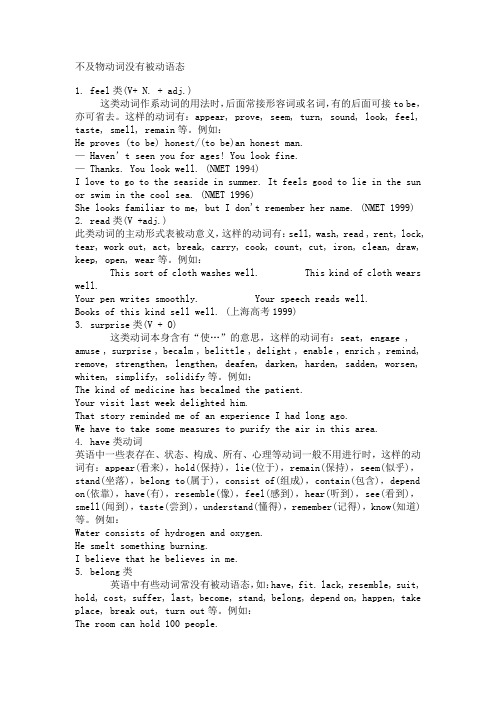
不及物动词没有被动语态1. feel类(V+ N. + adj.)这类动词作系动词的用法时,后面常接形容词或名词,有的后面可接to be,亦可省去。
这样的动词有:appear, prove, seem, turn, sound, look, feel, taste, smell, remain等。
例如:He proves (to be) honest/(to be)an honest man.—Haven’t seen you for ages! You look fine.— Thanks. You look well. (NMET 1994)I love to go to the seaside in summer. It feels good to lie in the sun or swim in the cool sea. (NMET 1996)She looks familiar to me, but I don't remember her name. (NMET 1999) 2. read类(V +adj.)此类动词的主动形式表被动意义,这样的动词有:sell, wash, read , rent, lock, tear, work out, act, break, carry, cook, count, cut, iron, clean, draw, keep, open, wear等。
例如:This sort of cloth washes well. This kind of cloth wears well. Your pen writes smoothly. Your speech reads well.Books of this kind sell well. (上海高考1999)3. surprise类(V + O)这类动词本身含有“使…”的意思,这样的动词有:seat, engage , amuse , surprise , becalm , belittle , delight , enable , enrich , remind, remove, strengthen, lengthen, deafen, darken, harden, sadden, worsen, whiten, simplify, solidify等。
不及物动词或动词短语无被动语态:

不及物动词或动词短语无被动语态:appear, die disappear, end (vi. 结束), fail, happen, last, lie, remain, sit, spread, stand break out, come true, fall asleep, keep silence, lose heart, take place.After the fire, very little remained of my house.比较:rise, fall, happen是不及物动词;raise, seat是及物动词。
(错) The price has been risen.(对) The price has risen.(错) The accident was happened last week.(对) The accident happened last week.(错) The price has raised.(对) The price has been raised.(错) Please seat.(对) Please be seated.要想正确地使用被动语态,就须注意哪些动词是及物的,哪些是不及物的。
特别是一词多义的动词往往有两种用法。
解决这一问题唯有在学习过程中多留意积累。
2) 不能用于被动语态的及物动词或动词短语:fit, have, hold, marry, own, wish, cost, notice, watch agree with, arrive at / in, shake hands with, succeed in, suffer from, happen to, take part in, walk into, belong toThis key just fits the lock.Your story agrees with what had already been heard.3) 系动词无被动语态:appear, be become, fall, feel, get, grow, keep, look, remain, seem, smell, sound, stay, taste, turnIt sounds good.4) 带同源宾语的及物动词,反身代词,相互代词,不能用于被动语态:die, death, dream, live, lifeShe dreamed a bad dream last night.5) 当宾语是不定式时,很少用于被动语态。
英语不能用被动语态的若干情况

英语不能用被动语态的若干情况■不及物动词没有被动语态,如rise, happen, succeed, remain, lie, disappear, last等。
如:After the fire, nothing remained.那场大火之后,什么也没留下来了。
误:After the fire, nothing was remained.■不及物动词短语没有被动语态,如:take place, break out, belong to等。
如:Great changes have taken place here since 1990.自1990年以来这里发生了巨大的变化.误:Great changes have been taken place here since 1990.■有的及物动词也没有被动语态,如cost, leave, enter, reach, suit, have, wish,hold, own, lack, fit, resemble, jump, mind等。
如:She entered the room just now.他刚才进过房间。
误:The room was entered by her just now.Tom jumped the queue.汤姆插队。
误:The queue was jumped by Tom.■有些及物的短语动词也没有被动语态,如agree with, arrive at/in, shake handswith, succeed in, suffer from, happen to, walk into, belong to等。
如:I don’t agree with him.我不同意他的看法。
误:He isn’t agreed with by me. ()■宾语是反身代词、相互代词、同源宾语、不定式、v-ing形式及抽象名词等,都不能变为被动句子的主语,如:I taught myself French.我自学法语。
被动语态特殊用法

一、不用被动语态动词:(1)have有(2)look,sound,smell,taste等连系动词(3)takeplace/happen (4)getto/arrive(at/in)/reach到达(5)rise升起,上升6)ring(铃响)(7)begin/start开始(8)lie躺,说谎※Thebooksellswell.(这本卖得好)※Themeatcookswell.(9)return(回来,回归—不用被动,归还—可用被动语态) (10)leave(离开—不用被动语态,留下/遗忘—可用被动语态) 二、常用被动语态:(1)belocatedin (2)becoveredwith (3)becalled (4)bemadeof(in/from) (5)bemadeupof (6)besetfor(7)betold被高知(tell后没人)(8)beasked todosth(9)beinvitedtodosth (10)bedressedup as (11)becutdown (12)beeatenup (13)beknockedover (14)bethrownaway (15)bewrittenin (16)bewelcomedby (17)beusedfordoingsth/todosth三、动词不定式的省to形式的被动语态:(变被动时,要还原to)※makesbdosth—bemadetodosth)※seesbdosth/watchsbdosth/hearsbdosth/noticesbdosth四、动词后面跟双宾语:(人在物前不用介词,物在人前要用介词to或for)–只需将其中的一个宾语(要么人,要么物)变成被动语态的主语五、“动词+副词”或“动词+介词“结构在变成被动语态后,介词或副词不能漏掉(1)Wemustlookafteroureyes. Oureyesmustbelookedafterbyus.(2)HowdidyoudealwiththedogHowwasthedogdealtwithbyyou六、谓语动词用主动表被动的情形(1)某些连系动词(如look,sound,smell,feel,taste,prove等)要用主动表被动,因为连系动词为不及物动词,它们没有被动语态形式:Thatdog looks dangerous.那只狗看起来很危险。
被动语态语法知识点精讲

被动语态语法知识点精讲:一、不用被动语态的情况(1) 不及物动词或动词短语无被动语态:appear, die disappear, end (vi. 结束), fail, happen, last, lie, remain, sit, spread, standbreak out, come true, fall asleep, keep silence, lose heart, take place.After the fire, very little remained of my house.比较:rise, fall, happen是不及物动词;raise, seat是及物动词。
(错) The price has been risen. (对) The price has risen.(错) The accident was happened last week.(对) The accident happened last week. (2) 不能用于被动语态的及物动词或动词短语:fit, have, hold, marry, own, wish, cost, notice, watch agree with, arrive at / in, shake hands with, succeed in, suffer from, happen to, take part in, walk into, belong toThis key just fits the lock.Your story agrees with what had already been heard.(3) 系动词无被动语态:appear, be become, fall, feel, get, grow, keep, look, remain, seem, smell, sound, stay, taste, turn It sounds good.(4) 带同源宾语的及物动词,反身代词,相互代词,不能用于被动语态:die, death, dream, live, lifeShe dreamed a bad dream last night.(5) 当宾语是不定式时,很少用于被动语态。
高考英语第一轮总复习名师课件(第4课):不用被动语态的情况(8张PPT)

不用被动语态的三种情况
2、系动词没有进行时和被动语态。
常用的系动词: 1、be动词:am, is, are ; was ,were 2、感官动词:look, seem, smell, taste, sound, feel. 3、表变化的词:become, get, turn ,grow, go 4、表保持、仍然的词:keep, stay, remain
store.
作业:
1、说出动词作谓语的解题思路。 2、常考动词10种时态的结构。 3、常考动词9种被动语态的结构。 4、不用被动语态的三种情况。
本节完
THANKS
高考英语总复习
名师课件
不用被动语态的情况
例题:改错:We were too tired because the meeting was broke up at dusk. 答案: 去掉broke 前面的was 归纳:动词做谓语时,要考虑不用被动语态的情况。
不用被动语态的三种情况
1、 不及物动词,没有被动语态,只有主动。
不用被动语态的三种情况
3、表示主语的性质、属性的词,不用被动语态。
表属性的词有:write, drive ,wash , sell , hang 挂; start, begin , open , close , shut.
例题1:Don’t worry, the blot on your coat can be washed (wash) cleanly because this kind of cloth washes (wash) so well.
补充: lie --- lied ----lied lie --- lay ---- lain
撒谎 平躺;位于
无被动语态的动词及短语
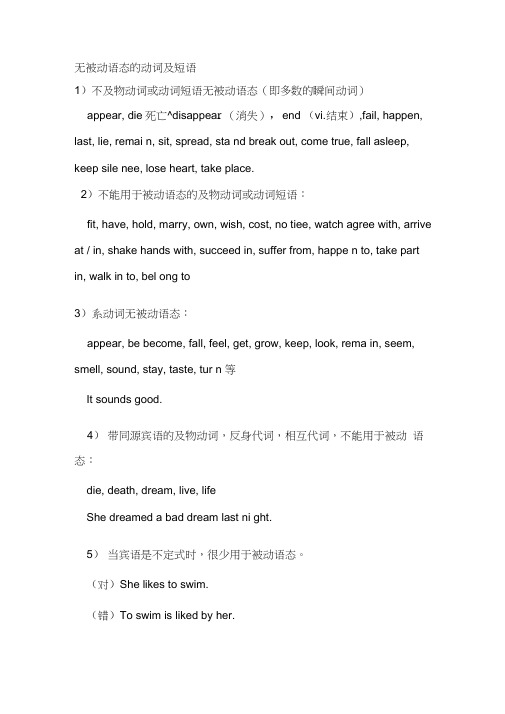
无被动语态的动词及短语
1)不及物动词或动词短语无被动语态(即多数的瞬间动词)
appear, die死亡^disappea r (消失),end (vi.结束),fail, happen, last, lie, remai n, sit, spread, sta nd break out, come true, fall asleep, keep sile nee, lose heart, take place.
2)不能用于被动语态的及物动词或动词短语:
fit, have, hold, marry, own, wish, cost, no tiee, watch agree with, arrive at / in, shake hands with, succeed in, suffer from, happe n to, take part in, walk in to, bel ong to
3)系动词无被动语态:
appear, be become, fall, feel, get, grow, keep, look, rema in, seem, smell, sound, stay, taste, tur n 等
It sounds good.
4)带同源宾语的及物动词,反身代词,相互代词,不能用于被动语态:
die, death, dream, live, life
She dreamed a bad dream last ni ght.
5)当宾语是不定式时,很少用于被动语态。
(对)She likes to swim.
(错)To swim is liked by her.。
英语被动语态
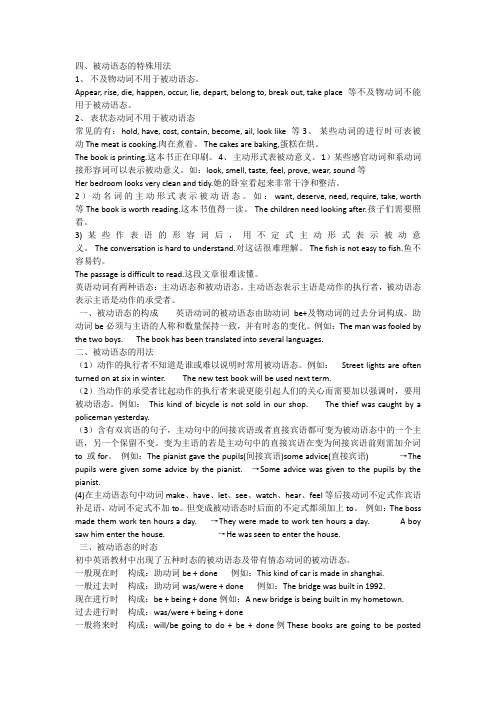
四、被动语态的特殊用法1、不及物动词不用于被动语态。
Appear, rise, die, happen, occur, lie, depart, belong to, break out, take place等不及物动词不能用于被动语态。
2、表状态动词不用于被动语态常见的有:hold, have, cost, contain, become, ail, look like等 3、某些动词的进行时可表被动 The meat is cooking.肉在煮着。
The cakes are baking,蛋糕在烘。
The book is printing.这本书正在印刷。
4、主动形式表被动意义。
1)某些感官动词和系动词接形容词可以表示被动意义。
如:look, smell, taste, feel, prove, wear, sound等Her bedroom looks very clean and tidy.她的卧室看起来非常干净和整洁。
2)动名词的主动形式表示被动语态。
如:want, deserve, need, require, take, worth 等 The book is worth reading.这本书值得一读。
The children need looking after.孩子们需要照看。
3)某些作表语的形容词后,用不定式主动形式表示被动意义。
The conversation is hard to understand.对这话很难理解。
The fish is not easy to fish.鱼不容易钓。
The passage is difficult to read.这段文章很难读懂。
英语动词有两种语态:主动语态和被动语态。
主动语态表示主语是动作的执行者,被动语态表示主语是动作的承受者。
一、被动语态的构成英语动词的被动语态由助动词be+及物动词的过去分词构成。
助动词be必须与主语的人称和数量保持一致,并有时态的变化。
- 1、下载文档前请自行甄别文档内容的完整性,平台不提供额外的编辑、内容补充、找答案等附加服务。
- 2、"仅部分预览"的文档,不可在线预览部分如存在完整性等问题,可反馈申请退款(可完整预览的文档不适用该条件!)。
- 3、如文档侵犯您的权益,请联系客服反馈,我们会尽快为您处理(人工客服工作时间:9:00-18:30)。
8、主语much, a great deal, little, what等,其表语如是不定式,则用不定式的
主动表被动。
9、在“there be”句型中作主语的定语如果现在分词时,所用的现在分词要用主动
表被动意义。
词用不定式的主动形式表示被动意义.
ቤተ መጻሕፍቲ ባይዱ
5、系动词没有被动形式,但有些系动词常表示被动意义。常见的有taste(吃起来),
sound (听起来), prove(证明是), feel(摸上去感到), look(看起来),smell(闻起
来)等。
6、一些与can''t(不能)或won''t(不会)连用的动词。常用的有: lock(锁住), shut(
关上) , open(打开), act(上演), write(写),cut(砍,切),wear(穿,戴)等,用
作不及物动词时,用主动表被动。
7、一些动词如sell(销售) , wash(洗), clean(打扫), burn(燃烧),cook(煮)等与副
词如well(好), easily(容易地), perfectly(十分地)等连用 ,描会事物的特性,用
动词不用被动语态
1、 Need, want, require(要求,需要), deserve(应得,值得), be worth值得,
not bear(经不住) 后面接doing主动表被动。
2、不定式作定语,放在被修饰词后面,与前面被修饰的名词或代词有动宾关系,又
在句子中与另一名词或代词有主谓关系,不定式要用主动表被动含义。
3、不定式修饰作表语和宾语补足语的形容词时,结构:主语+系动词+形容词 + 不定
式; 动词+宾语+形容词+不定式。如果形容词是表示难易、利弊等含义.
4、在be to结构中的一些不定式:这种结构中的不定式通常应用主动表被动。下列动
